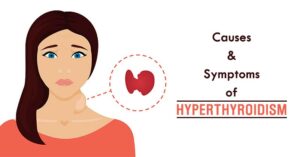Thyroid & Hyperthyroidism-
Thyroid disease is a group of disorders that affects the thyroid gland. The thyroid is a small, butterfly-shaped gland in your neck that makes thyroid hormones. Thyroid hormones control how your body uses energy, affecting nearly every organ in your body works—even the way your heart beats.
Sometimes the thyroid makes too much or too little of these hormones. Too much thyroid hormone is called Hyperthyroidism and can cause many of your body’s functions to speed up. “Hyper” means the thyroid is overactive. Too little thyroid hormone is called hypothyroidism and can cause many of your body’s functions to slow down. “Hypo” means the thyroid is underactive.
Symptoms and effects of Hyperthyroidism-
High amounts of T4, T3, or both can cause an excessively high metabolic rate. It is called a hypermetabolic state. When in a hypermetabolic state, you may experience the Following-
- Rapid Heart Rate
- elevated blood pressure
- hand tremors
- weight loss
- irregular menstrual cycles.
The following symptoms require immediate medical attention:
- dizziness
- shortness of breath
- loss of consciousness.
Hyperthyroidism in Pregnancy is harmful to both Mother and Baby- An untreated hyperthyroidism during pregnancy can lead to
- miscarriage
- premature birth
- low birth weight
- preeclampsia—a dangerous rise in blood pressure in late Pregnancy
- thyroid storm—a sudden, severe worsening of symptoms
- congestive heart failure.
How to Diagnose Hyperthyroidism-
- Cholesterol test
Your doctor may need to check your cholesterol levels. Low cholesterol can be a sign of an elevated metabolic rate, in which your body is burning through cholesterol quickly. - T4, free T4, T3
These tests measure how much thyroid hormone (T4 and T3) is in your blood. - Thyroid-stimulating hormone level test
Thyroid-stimulating hormone (TSH) is a pituitary gland hormone that stimulates the thyroid gland to produce hormones. When thyroid hormone levels are normal or high, your TSH should be lower. An abnormally low TSH can be the first sign of Hyperthyroidism. The ideal Timing for sample collection for the Thyroid Hormone test is the morning Fasting sample.
Triglyceride test. Your triglyceride level may also be tested. Similar to low cholesterol, low triglycerides can indicate an elevated metabolic rate. - Thyroid scan and uptake
This allows your doctor to see if your thyroid is overactive. In particular, it can reveal whether the entire thyroid or just a single gland area is causing the overactivity. - Ultrasound
Ultrasounds can measure the size of the entire thyroid gland and any masses within it. Doctors can also use ultrasounds to determine if a group is solid or cystic. - CT or MRI scans
A CT or MRI can show if a pituitary tumor is present causing the condition.
Early diagnosis is the key to preventing the harmful consequences of a thyroid imbalance.
By- Best Pathology Lab on Sinhgad Road Sahayog Pathology Laboratory. For more info, visit us at https://sahayogdiagnostics.in/


